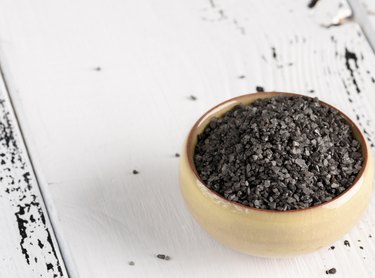
Indian black salt is purported to have health benefits that make it a more viable option than the table salt we use on a daily basis. But are those claims substantiated? And what is it important to know about salt when it comes to our health?
Tip
Indian black salt is not purported to have any more health benefits than other types of salt.
Video of the Day
Health Benefits of Indian Black Salt
Indian black salt, also known as kala namak, Himalayan black salt, sulemani namak and kala loon, is most commonly used in India, Pakistan and other parts of Asia. According to onegreenplanet.org, it turns from Himalayan pink salt to Indian black salt when it's heated at extremely high temperatures and combined with Indian spices and herbs.
Video of the Day
Despite claims that other varieties of salt, such as Indian black salt, have extra health benefits, Australia's Queensland Health explains that these claims are unsupported. If there are minerals in other varieties of salt, they exist in very trace amounts.
At the end of the day, Himalayan salt, black salt and pink salt are all still salt, and must be consumed in moderation. If you're looking to add nutrients to your diet, fruit and vegetables are the way to go. Though advertisers may tout the benefits of Indian black salt, it's important to be wary of these health claims and remember that any differences from regular salt are minimal.
Read more: 10 Myths About Salt Debunked
Controlling Salt Intake
A small amount of salt is good for our health, says Better Health Channel, as it helps maintain the correct volume of circulating blood and tissue fluids in our bodies. Though too much salt can be detrimental to your health.
An increase in sodium can cause high blood pressure, among other conditions. According to Better Health Channel, there's a strong link between populations with a high sodium intake and higher blood pressure levels. Other conditions linked to high salt intake include kidney problems, osteoporosis, stroke and fluid retention (edema).
Many people believe that consuming salt before or after strenuous exercise will help you avoid muscle cramping, but the only way to avoid muscle cramps during exercise is by regularly drinking water and staying hydrated.
Though small amounts of salt are necessary for proper functioning, it's important to avoid too much salt consumption to maintain a healthy diet. The U.S. Food and Drug Administration recommends having no more than 2,300 milligrams of salt per day (equivalent to a teaspoon of table salt).
Other Types of Salt
Nowadays, there are several types of salt on the market, some of which are used not only in the kitchen, but also as an ingredient in scrubs and makeup.
According to microscopy-uk.org, the most commonly used type of salt is iodized salt, which makes up about 70 percent of salt sales in the U.S. While it's used in home cooking, many processed foods don't use iodized salt, which may cause iodine deficiency in those who regularly consume processed foods.
Himalayan salt is often used in cooking, as well as in beauty products and as decoration in lamps. Similarly, Celtic salt is commonly used in cooking and beauty products, though it's not used as table salt, as it's moist and would be difficult to pour it out of a salt shaker.
You can find Hawaiian red sea salt in native Hawaiian dishes such as poke and Hawaiian Jerky, and microscopy-uk.org claims that many of its nutrients can be absorbed through the skin, which is why it makes for a popular scrub.
Salt, no matter the kind, has its health benefits when consumed in small amounts. Just be wary of your intake amount and false claims regarding promised benefits of Indian black salt, as well as other types of salt.